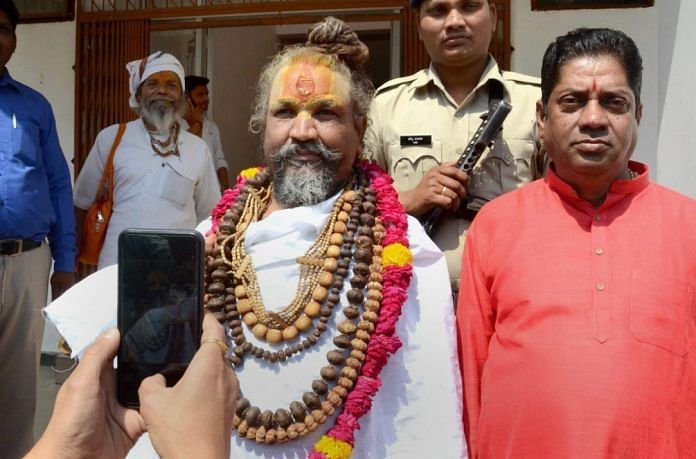The godmen, always powerful in India, have moved from being shadowy Rasputin figures to the centre stage in an administration.
In Madhya Pradesh, the proposed Narmada ghotala yatra now seems to have morphed into a ‘Baba ghotala’.
The religious gurus who had threatened a 45-day Narmada ghotala yatra to expose corruption in the Shivraj Singh Chouhan government have not only called off their agitation after an emergency meeting with the chief minister, but have been granted minister of state status.
“It’s our government, a saffron government. Shivraj is ours and it is a government of saints,” said Namdev Tyagi aka Computer Baba, who had been railing against Chouhan just days ago for “destroying the Narmada and failing to stop cow slaughter”.
This latest twist in Madhya Pradesh politics probably says more about our godmen than it does about politicians. Chouhan did what politicians always do, defuse an embarrassing situation, co-opt an opponent, defang an opposition movement, and quell restlessness in the ranks with handouts. The godmen, always powerful in India, have moved from being shadowy Rasputin figures to the administration’s centre stage.
Certainly, whether acche din have come for the rest of Indians or not, they have arrived for our godmen.
This is not new. Godmen have always wielded power. Once we gossiped about the clout wielded by a Dhirendra Brahmachari over Indira Gandhi, or a Chandra Swami over P.V. Narasimha Rao. Now, there’s no need to whisper and insinuate. We raised eyebrows about the wealth and empires of the Sai Babas and Baba Ramdevs. Now, the godmen do not want to be behind the scenes anymore.
Politicians do not just want to helicopter over to them and pay obeisance. They are not content with granting land for ashrams and temples. The government comes bearing ministers of state status to the gurus it wants on its side. And the godmen accept.
There was an uproar not long ago when the Haryana government wanted to offer Baba Ramdev cabinet status. Baba Ramdev adroitly said he wanted to remain a “baba and a fakir”.
“Now, that the PM is ours, entire Cabinet is ours, the Haryana CM is ours and his Cabinet is ours, let baba remain a baba...I want to serve you like this only (by remaining a baba),” said Ramdev. We were used to godmen as kingmakers. In the age of Yogi Adityanath we need to get more accustomed to godmen who want to be king.
That we accept all this as par for the course says something about us. Even at a time when the Gurmeet Ram Rahims are exposed in a court of law and Asaram Bapus are charged with rape, our faith in godmen of all stripes remains unshaken. Of course, this is not unique to India.
Evangelical preachers play a starring role in US politics and have largely lined up behind Donald Trump, setting aside their own homilies about Christian values. The southern Baptist minister Billy Graham, who died recently, enjoyed enormous influence over the White House, providing spiritual counsel to every US president from Harry S. Truman to Barack Obama, being particularly close to Lyndon Johnson and Richard Nixon.
But in India, they are not spiritual advisers. Godmen are just as much businessmen, wheeler-dealers and power brokers as any other politician.
It’s easy to see what Shivraj Chouhan and the babas have gained with this latest move in Madhya Pradesh, a move whose cost will be borne by the public. But it’s a different question about what the Narmada will gain.
India’s beleaguered rivers certainly need all the divine help they can muster. In a sense, it makes absolute sense to have holy men involved in saving the holy rivers. Sant Balbir Singh Seechewal became known as Beinwale Baba after he waded into the polluted Kali Bein river with his sewadars to clean it. Swami Nigamananda died on the 115th day of his hunger strike to protest against illegal quarrying in the Ganga river bed.
Baba Nagnath Yogeshwar, who went on a fast in 2008 to demand the Ganga be made pollution-free, and protested against the construction of dams in Uttarkhand, died six years later in 2014.
That was the idea behind putting Uma Bharti in charge of the Ganga rejuvenation project. But though she makes threats about fasting to death if Ganga cleaning does not begin by October 2018, the fact is she was removed from that post because of non-performance.
While we may roll our eyes and crack jokes about the Computer Babas who have become ministers of state, there is a tragic missed opportunity as well. A religious figure could have used his clout to hold the government accountable on an issue that was about the larger ecological well-being of the state, not just a particular community. But it was just political power play, and now that the gurus have got plum positions and perks, it will be interesting to see if the Narmada is any cleaner as a result of it.
Years ago, in the time of Rajiv Gandhi, India learned about the “babalog”, his westernised Doon School mates, the brown sahibs who wielded way too much power and were seldom held to account in his administration. Now, thanks to the largesse of the likes of a Shivraj Chouhan, we are faced with a new kind of babalog in Indian politics.
Sandip Roy is a journalist, commentator and author.



